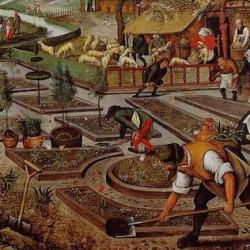In his classic The Quest for Community: A Study in the Ethics of Order and Freedom (Background: Essential Texts for the Conservative Mind) , recently republished by ISI, Robert Nisbet places the rise of capitalism within the history of modern Statism.
He notes, “The expansion of the State in European history has been both territorial and functional,” and is most interested in the latter. Over time, the State has gradually absorbed “powers and responsibilities formerly resident in other associations and by an increasing directness of relation between the sovereign authority of the State and the individual citizen.” Debates about the limits of state power and the intervention of the State in should not overlook the fact that “the whole history of the State in Europe has been characterized by innumerable ‘interventions’ in the economic and moral life of people” (p. 94 in the 1990 edition).
He discovers these interventions everywhere:
“ . . . in the establishment of the King’s Peace and in the beginnings of the common law in England, in the increasing utilization of Roman law principles for the centralization and consolidation of royal power on the Continent, in the growing conception of the State as the source of prescriptive law, in the invasions of the State into matters of property disposition, inheritance, and alienation of shares, in control of kinship activities formerly vested in the family alone, and in the increasing power of functions and authorities traditionally resident in the Church” (p. 94).
Economically, Nisbet acknowledges the role of “internal conflicts of a purely economic sort in the gild system” and the rise of a middle class. But he generalizes this way: “Apart from the massive changes that were taking place in the structure of political power during the fifteenth and sixteenth centuries, capitalism would never have come into existence. The State’s development of a single system of law, sanctioned my military power, to replace the innumerable competing laws of gilt, Church, and feudal principality; its deliberate cultivation of trade in the hinterland; its standardized systems of coinage, weights, and measures; its positive subsidies and protections to those new businessmen who were seeking to operate outside the framework of gild and Church; its creation of disciplined State workhouses – all provided a powerful political stimulus to the rise of capitalism.” Most importantly, “the State offered, through its efforts at territorial consolidation of law, a scene increasingly imperial and calculable – a scene within which businessmen might operate as individuals rather than as members of a traditional group” (pp. 94-95).
He is left wondering “how far capitalism was the work of the businessman at all, and how far it was the consequence of the overthrow of the medieval system by the military might of the absolute State” (p. 95). If that sounds cynical, he adds in an endnote (p. 257): “There is indeed much to be said for regarding capitalism as simply the forced adjustment of economic life to the needs of the sovereign State in the various national areas.”










